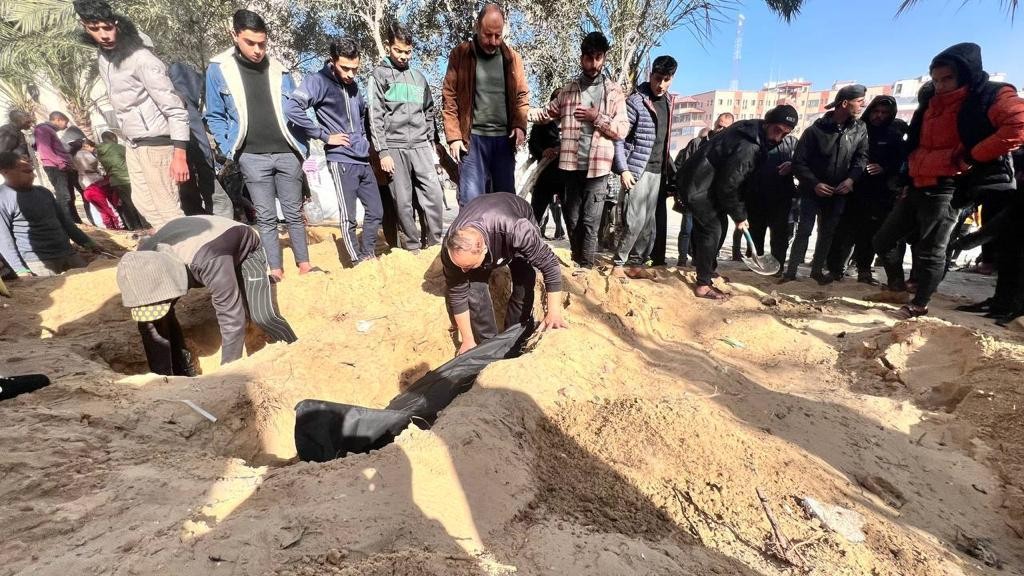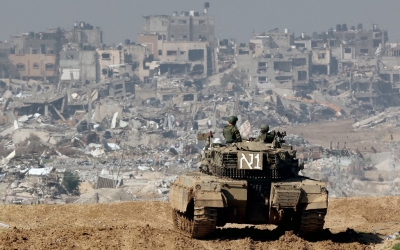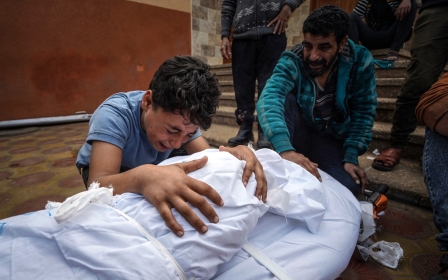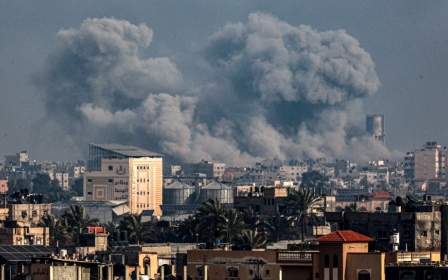War on Gaza: Israel attacks shelters and homes in Khan Younis, killing dozens
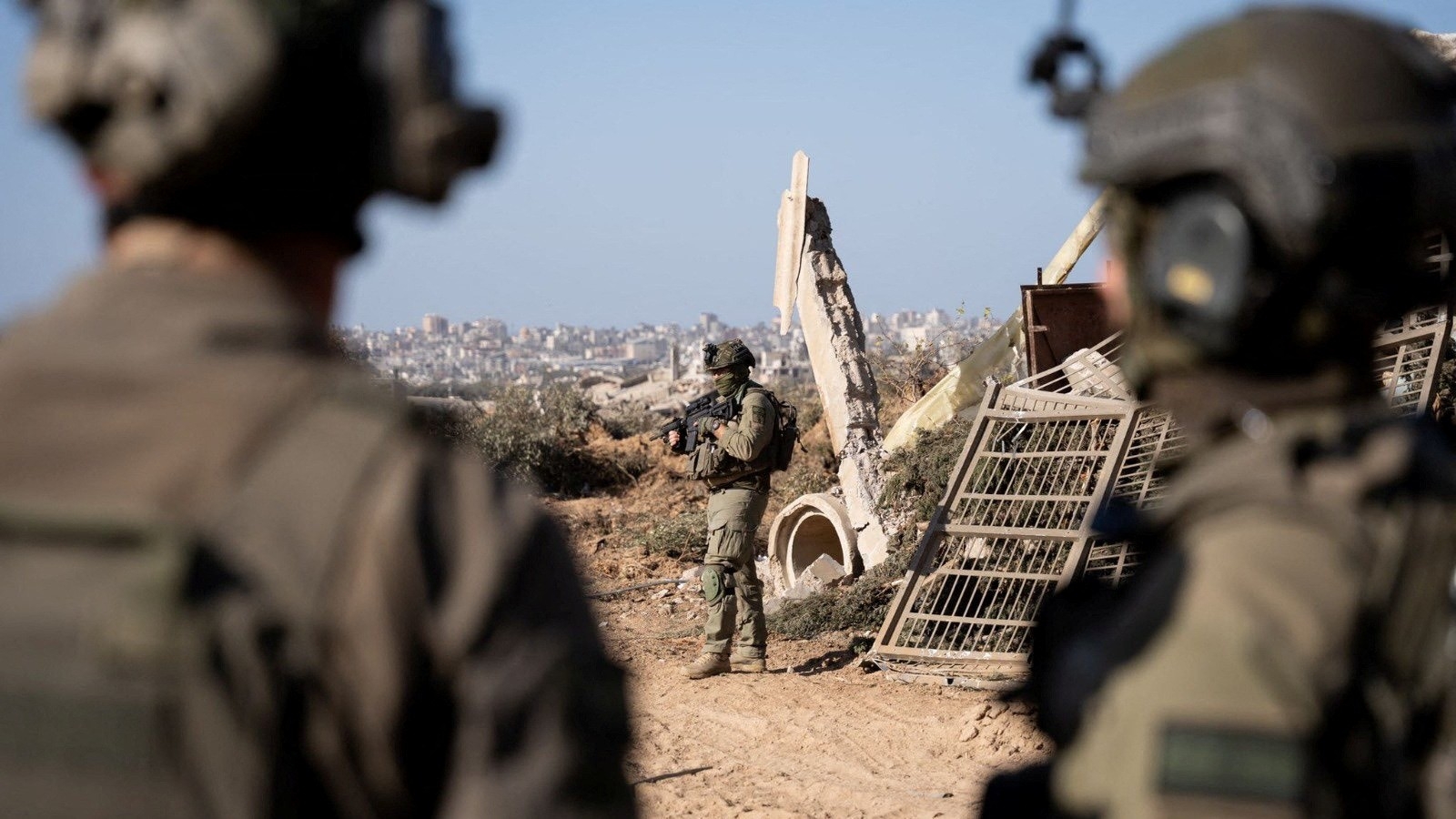
The Israeli army on Monday intensified its air, land and sea assaults on the southern city of Khan Younis, killing dozens of civilians and prompting fears that its main Nasser hospital will be attacked.
The area, once designated a safe zone by the Israeli army, is now witnessing one of the heaviest days of fighting since the beginning of the war on 7 October.
The Palestinian health ministry said the Israeli army “committed 20 massacres” against civilians across the Gaza Strip over the past 24 hours.
The latest attacks bring the total number of Palestinians killed to 25,295 and those wounded to at least 63,000.
The Nasser hospital, which is among the last few operating hospitals in the war-torn Strip, received at least 50 bodies of killed civilians and 100 wounded on Monday, but there are no vacant beds and the operation rooms and intensive care units are full, doctors told Middle East Eye.
New MEE newsletter: Jerusalem Dispatch
Sign up to get the latest insights and analysis on Israel-Palestine, alongside Turkey Unpacked and other MEE newsletters
Many of the casualties arriving at the hospital are from gunfire from Israeli snipers situated on civilian buildings.
Meanwhile, the Palestinian Red Crescent said on Monday that the Israeli military is attacking its ambulance centre, preventing first responders from reaching the wounded in Khan Younis, and targeting anyone attempting to move in the area.
The Nasser Medical Complex now has a mass grave as people are unable to leave the hospital to bury their loved ones due to the constant tank shelling and bombardment in the vicinity of the hospital.
Residents of attacked areas have been forced to carry casualties on their own and bring them to the hospital, as ambulances and rescue teams are unable to transport people under ongoing Israeli shelling and bombardment.
“We’ve sent out lots of calls to help the wounded and extract bodies but the area is very dangerous, the bombardment is ongoing,” Amro Abu Tabash, an eyewitness, said.
“Bodies of dead and wounded are being taken to Nasser hospital via carts pushed by young men,” he told MEE.
“Until now medical rescue teams find it extremely difficult to extract bodies and wounded from sites of attacks, which are random and in residential areas,” he said.
The Israeli army is situated on all exits from Khan Younis and has imposed a siege on the city, a resident of the city said. No one is allowed to enter or exit, he added.
“I don't recommend entering or exiting Khan Younis. It’s very dangerous.”
The UN Agency for Palestine Refugees (Unrwa) said on Monday that telecommunication services in Gaza have been down for the past seven days.
“Disruption of telecommunication services prevents people accessing life-saving information, calling first responders & continues to impede humanitarian response,” it said on X, formerly Twitter.
Fears of attacking Nasser hospital
The attacks have targeted several areas of Khan Younis, according to residents, including the surroundings of Al-Amal Hospital, Al-Aqsa University, in addition to Quizan an-Najjar, Al-Batn Alsameen, and Al-Mawasi neighbourhoods.
"The situation in Khan Younis dramatically flipped yesterday. While we were expecting a gradual withdrawal of the Israeli tanks, we were surprised that the tanks had reached Al-Mawasi, where we are seeking refuge now,” said Mohammed, a 37-year-old displaced man in Al-Mawasi. “This area was considered safe earlier."
'Quadcopters are spread throughout the area, ready to fire if anyone leaves their places. We are trapped here'
- Displaced man, Khan Younis
"I am talking to you now while I can see the tank at the end of the street. The Israeli battleships also fired shells yesterday.
"Some people already have tents on the beach due to the overcrowding here. They had to escape while some were killed immediately,” he told MEE.
The bombardment also intensified near Al-Aqsa University, where thousands of people have sought refuge, he added.
“Quadcopters are spread throughout the area, ready to fire if anyone leaves their places. We are trapped here. We are not able to leave to seek food or any life essentials,” he said.
“We expect the Israeli tanks to reach Nasser Hospital soon. What they are doing now is paving the way for the tanks to enter the area there."
Shelters attacked
Doctors at Nasser hospital have voiced the same concerns.
“We are concerned about a recurrence of the scenario that occurred in hospitals in the northern and central parts of Gaza,” surgery director Naheed Abu Taema told reporters on Monday.
“We call for the protection of the complex and medical staff from targeting. There is a large number of displaced persons inside the hospital. Gunfire continues in the vicinity of the complex now.”
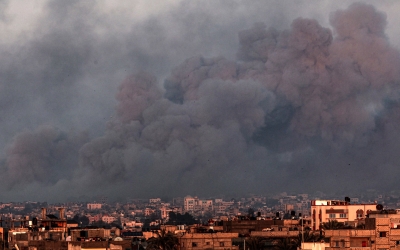
Monday night has been the toughest since the beginning of the war, according to residents, with the Israeli army launching attacks by air, sea and land.
Some people miraculously managed to escape Khan Younis on Sunday, facing the risk of death on their way.
Israeli soldiers stormed homes in the Tiba Towers area of Khan Younis, causing panic among women and children.
Eyewitnesses also told MEE that the Israeli army bombarded five shelters for internally displaced people in Khan Younis on Monday, where at least 30,000 people have sought refuge.
A statement from the Gaza government via Telegram said the targeted shelters are Al-Aqsa University, University College Accommodation, Khalidiya School, Al-Mawasi School and Khan Younis Industry shelters.
“[The Israeli army] claimed they were safe shelters and called on citizens to seek refuge in them, then committed a massacre that left many martyrs," the statement said, without confirming the number of those killed.
Al-Aqsa University campus in Khan Younis opened its doors for the refugees from the north of the Strip following the Israeli assault on 7 October.
"Today, the university has been bombarded by the Israeli occupation which has led to the death of a number of people," said a statement by Birzeit University, based in the occupied West Bank, in a post on X.
"Birzeit sees this as a blatant violation of all the international charters and laws that incriminate the violation of the sanctity of academic institutions," it added.
"The Israeli occupation, since Oct. 7, has destroyed more than 390 academic institutions, the last of which was bombing Al-Israa University, and The Islamic University. The university calls on the world to work in order to stop these genocidal crimes in Gaza," the university said.
Israel vows to continue operation
Israel’s defence chief Yoav Gallant on Monday said that his forces will escalate their ground offensive on Khan Younis.
“We are carrying out an intensive operation in the Khan Younis area and it will continue to expand,” said Gallant.
“The plumes of smoke from the tanks, artillery and air force planes will continue to cover the skies of the Gaza Strip until we achieve our goals - chief among them the defeat of Hamas and the return of hostages to their homes.”
Since the deadly Hamas-led incursion into southern Israel on 7 October that killed 1,139 people and took more than 200 people to Gaza as captives, Israeli officials have vowed to destroy the group.
But after more than three months of fighting, it is estimated by both Israel and the US that only 20-30 percent of Hamas fighters have been killed, and that the goal of eradicating the group is far from being achieved.
Meanwhile, an estimated 130 Israeli captives are still in Gaza, according to the Israeli government.
Gallant said the Khan Younis operation is a step towards the goals of releasing the captives and defeating Hamas.
“Operations in Khan Younis are at a high point, and there are early signs that [we] are arriving at the most sensitive locations for Hamas [which] are getting us closer to the two goals of the war,” he was quoted as saying by The Jerusalem Post.
European Union chief diplomat Josep Borrell said on Monday that the humanitarian situation in the Gaza Strip "could not be worse", adding that "certainly Israel's way it tries to destroy Hamas is wrong."
"From now on I will not talk about the peace process, but I want a two-state-solution process," Borell told journalists ahead of an EU foreign ministers' meeting.
Middle East Eye delivers independent and unrivalled coverage and analysis of the Middle East, North Africa and beyond. To learn more about republishing this content and the associated fees, please fill out this form. More about MEE can be found here.


